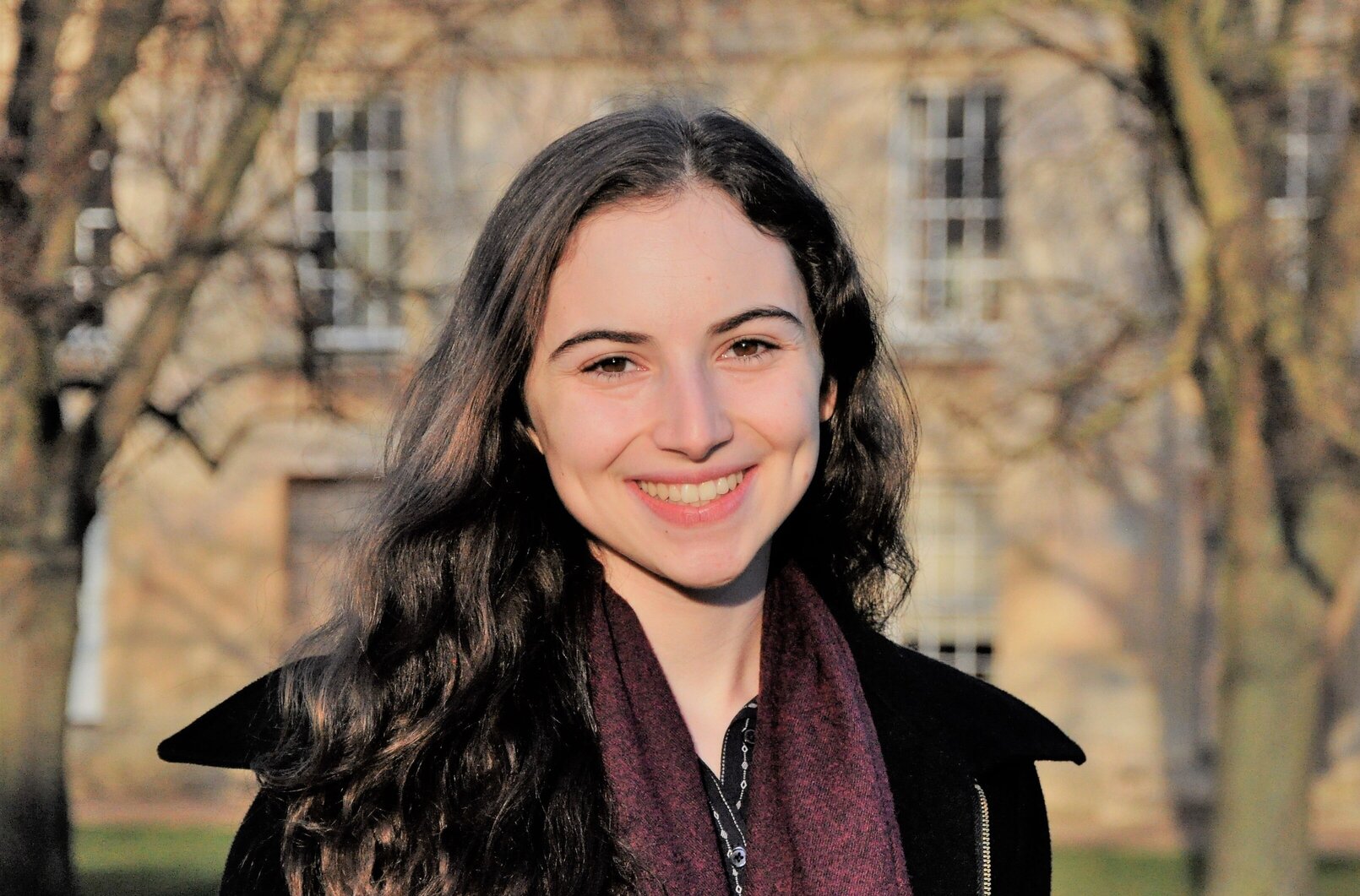
Leor Zmigrod will be speaking at Hay Festival in June about her award-winning research in the emerging field of political neuroscience.
I’m interested in the ways ideologies are imprinted on our brains and whether we can erase or undo ideologies’ dangerous influences in ways that are healthy.
Leor Zmigrod
What makes some people more vulnerable to extremism than others? How do we build cognitive resilience against extreme ideologies? And how does the brain react to misinformation on social media? These are some of the key political questions that political neuroscientist Leor Zmigrod [2016] is exploring, putting the science into our understanding of radicalisation.
Leor says she is interested in delving deeper into how the brain constructs reality and how this relates to our political views. Her research shows links between political views and the way people carry out practical tasks – for example, those who are more conservative approach them with noticeably more caution – and that people’s cognitive rigidity on neuropsychological tasks predicts their ideological rigidity in politics, religion, nationalism and other social beliefs.
“The way our brains understand the sensory world can help us to understand why and how people get a grip on the political world,” she states. “I want to drill a little deeper into building an account of the origins of our ideological beliefs and why some people are strong believers and others have a looser attachment. I’m interested in the ways ideologies are imprinted on our brains and whether we can erase or undo ideologies’ dangerous influences in ways that are healthy.”
Next month she will give a talk at the Hay Festival as part of the Cambridge Series on what science tells us about what it means to think in an ideologically extreme way, where our ideologies come from, what the consequences of extremist thinking are for our brains and how we get out of that cycle “so that we can be free to live authentically and not beholden to norms and rituals that can be toxic for our brains and for others”.
Other speakers in the series include Professor David Runciman on the origins of new political ideas, Professor Diane Coyle on the need for a different economic model, Professor Emily Shuckburgh and Professor Bhaskar Vira on building more equitable futures in the shadow of climate crisis, Dr Giles Yeo on why our current approach to calorie counting is wrong and Professor Clare Chambers on the current pressure to modify our bodies and the damage it causes.
Background
Leor’s family moved around during her childhood which gave her an insight into new cultures and different ideas. Her high school was an international school in the Netherlands which meant she was surrounded by interesting discussions about how identity is constructed and about people’s different belief systems. “In such an international environment I was constantly thinking about where beliefs come from and how we construct the norms and rituals we live by,” she says.
At school she was in the model UN, took part in debates and was in various European youth networks that thought about global issues, but she had not studied politics or, indeed, psychology or neuroscience before university. However, her mother bought her a subscription to the Scientific American Minds magazine and that had led to Leor reading books around the subject. “I loved all these puzzles psychologists and neuroscientists were grappling with,” she says. She became fascinated by human behaviour and mysterious phenomena like phantom limbs and the origins of consciousness.
Cambridge
When Leor finished secondary school, she applied to Cambridge as the university had just launched a new psychology degree with a focus on experimental psychology and cognitive neuroscience. She didn’t know anyone who had gone to Cambridge and felt applying was a bit of a gamble – which is somewhat ironic, given that, just 10 years later, she is a Director of Studies at the university and interviews applicants herself. Leor had her interview at Downing College and its master the leading behavioural neuroscientist Professor Barry Everitt, Provost of the Gates Cambridge Trust, was one of her interviewers.
She loved her three-year course and spent the summers on research internships. Because hers was the first year of the new degree students were allowed to do a research project in the second year. That experience proved a turning point for Leor. She did a meta analysis, under the supervision of Professor Jon Simons, on what happens to different parts of the brain when people have hallucinations. It investigated whether there is a place in the brain that realises that the hallucinations are not real and it linked to new work being done on how we construct our beliefs – in this case, our sensory beliefs. The paper on this work remains Leor’s most highly cited study.
Leor really took to research and in the summer of her second year did a research internship at University College London on the neuroscience of free will, looking at how the brain distinguishes between voluntary actions and those that they are instructed to perform and whether it can determine if an action was chosen or not.
PhD
By her second year Leor knew what she wanted to do her PhD on. She had approached Professor Trevor Robbins about using cognitive neuroscience and experimental psychology to understand what makes individuals susceptible to extremism. “I was really interested in why some people are more susceptible to different ways of thinking,” she says.
Her proposal came before Brexit and Trump’s election in the US changed the political landscape. “We thought at the time that my research would be super niche,” says Leor. She applied for her PhD, received a Gates Cambridge scholarship and in the summer before she started work – on the day of her graduation indeed – the news that the UK had voted for Brexit broke. Yet very few people foresaw the election of Donald Trump as president of the US later that year. Leor was not among them. She immediately set to work putting together a study on political ideology in relation to the elections.
She realised immediately that she could not do a face to face study in Cambridge as it would not be representative so she developed an online study for US participants to gauge their world views and attitudes. It involved a set of cognitive tests and was pioneering because similar tests were done in the laboratory at the time. Using new software, which she researched, Leor was able to measure hundreds of people’s cognitive styles in relation to their political leanings and their response to the election results in real time.
The first two years of her PhD, supervised by Professor Robbins, were very fruitful. Leor was able to use her new method to do a lot of studies, including of the cognitive traits that predict attitudes to Brexit. Her work attracted a lot of press attention. “The questions that I was fascinated by suddenly within a year seemed to be of interest to everyone,” she says. She found the press attention stimulating and it made her reflect on how to communicate science about politics in a highly politicised landscape and how to make sure the science was represented ethnically.
During her PhD, which she finished in 2019, she helped to scope out the parameters of the emerging field of political neuroscience, for instance, looking at how to define terms such as ideology from a psychological perspective.
She spent some time in Stanford and five months in Harvard sharing her research and acquiring new research skills.
Research fellowship
After finishing her PhD Leor has remained at Cambridge where she is a research fellow and has been collaborating with academics from different disciplines, including economics, philosophy and, of course, politics. Her current work is focused on people’s susceptibility to different political groups, their voting patterns and the relationship between different ideological variables. She is also working on a popular science book. In September she begins a fellowship at the Berlin Institute for Advanced Study which will give her time to think.
Leor has won a string of awards and accolades in the last few years. She was, for instance, listed on Forbes 30 Under 30 in the Science and Healthcare category and awarded the ESCAN 2020 Young Investigator Award by the European Society for Cognitive and Affective Neuroscience. Leor, who is the Director of Studies for the Psychological and Behavioural Sciences Tripos at Churchill College, Cambridge and for Clare College, recently won the 2020 Women of the Future Science Award and the 2022 Women in Cognitive Science Emerging Leader Award. Her research has been featured in The New York Times, The Guardian, TIME, New Scientist, Financial Times and The Times, amongst other international outlets. In 2021, Leor was a shortlisted finalist for the prestigious Albert Einstein Fellowship.
In addition to her academic achievements, Leor has also been working with policymakers in the UK on counter extremism, identifying who is the most vulnerable to extremism based on scientific evidence to make sure deradicalisation work is more evidence-based. She is also talking to policymakers in other countries.
She states: “It has been very exciting to be in such a newly emerging field; the challenge is to ensure the science is as robust as it can be.”
*Leor Zmigrod will be speaking at Hay Festival on 29th May at 1pm. You can book tickets here.












